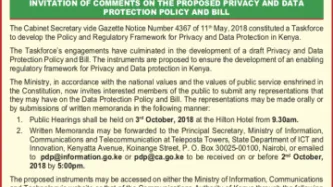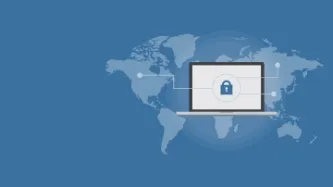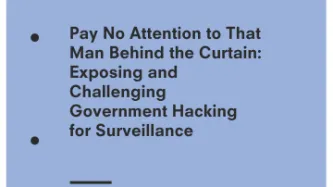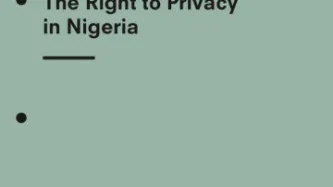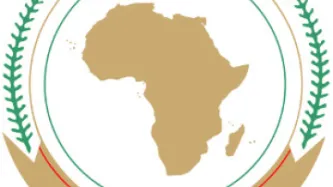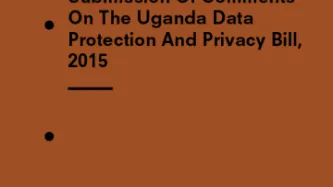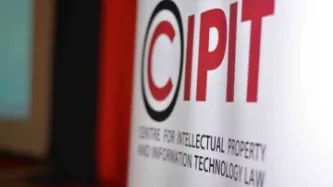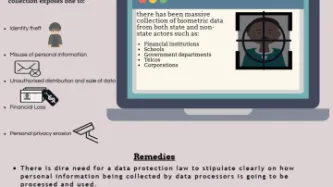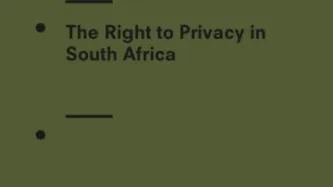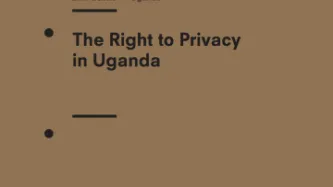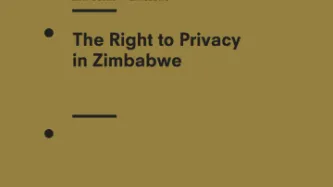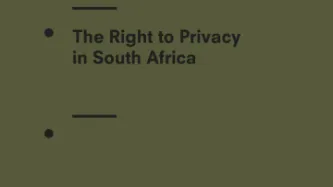Search
Content type: Examples
The Nigerian startup uLesson, which began by offering pre-recorded lessons on dongles, now delivers livestreamed interactive video classes to learners in a number of African countries as well as the US and UK. One of uLesson's investors is Tencent, which also backed at least three Chinese EdTech companies between 2018 and 2021 before China began requiring companies teaching compulsory primary and middle school subjects in China to register as "nonprofit institutions".Article: Chinese-backed…
Content type: Examples
Public-private partnership launches biometrics identity and vaccination record system in West Africa
In July 2020 a public-private partnership programme between the Bill Gates-backed GAVI vaccine alliance, Mastercard, and the AI identity authentication company Trust Stamp was ready to introduce a biometric identity platform in low-income remote communities in West Africa. The programme will integrate Trust Stamp’s digital identity platform into the GAVI-Mastercards “Wellness Pass”, a digital vaccination record and identity system powered by Mastercard’s AI and machine learning technology,…
Content type: Examples
In order to reopen borders and restart travel and trade, the East African Community is working with Switzerland-based The Commons Project, a public trust that builds digital services for public good in order to develop an app called CommonPass. The app, which will be designed in a July sprint, will allow travellers to share a recent COVID-19 test in a way that ensures the results cannot be falsified or counterfeited while preserving their personal privacy. The digital health passport will start…
Content type: Examples
The UN’s Economic Commission for Africa has launched the Africa Communication and Information Platform for Health and Economic Action thta will use AI and big data to provide two-way communication between citizens and health authorities. It will launch in 36 countries, with more to come as others sign up. The service will potentially research 80% of Africa’s mobile users at no cost to them, and will collect health information from individuals to allow authorities to identify local outbreaks and…
Content type: Case Study
Photo by Roger H. Goun
Chloe is an investigative journalist working for an international broadcast service; we will call the TV show she works for The Inquirer. She travels around the world to work with local journalists on uncovering stories that make the headlines: from human trafficking to drug cartels and government corruption. While her documentaries are watched by many and inspire change in the countries she works in, you would not know who Chloe is if we were to tell you her real name.…
Content type: Advocacy
In parallel to the legislative process initiated by the Kenya Senate in July 2018, a Task Force constituted by the Ministry of Information, Communication and Telecommunication developed a draft Data Protection Bill which it published for consultation in May of this year.
Privacy International and its Kenya Partners, the National Coalition of Human Rights Defenders – Kenya (NCHRD-K), the Centre for Intellectual Property and Information Technology (CIPIT) are pleased to have had the…
Content type: News & Analysis
Our intervention comes on the back of mounting evidence that the South African state’s surveillance powers have been abused, and so-called “checks & balances” in RICA have failed to protect citizens’ constitutional right to privacy.
Among our core arguments are:
That people have a right to be notified when their communications have been intercepted so that they can take action when they believe their privacy has been unlawfully breached. Currently RICA prevents such notification, unlike…
Content type: Advocacy
This photo originally appeared here.
For years, Privacy International and our partners in Kenya have been promoting the right to privacy in Kenya through research and investigations into government and private sector policies and practices and advocating for the adoption and enforcement of the strongest data protection and privacy safeguards.
The need for Kenya to adopt a comprehensive data protection framework (in addition to strengthening privacy protections in other legislation) has always…
Content type: News & Analysis
As the international cyber security debate searches for new direction, little attention is paid to what is going on in Africa. Stepping over the remains of the UN Group of Governmental Experts, and passing by the boardrooms of Microsoft struggling to deliver their Digital Geneva Convention, African nations are following their own individual paths.
Unfortunately, these paths increasingly prioritise intrusive state surveillance and criminalisation of legitimate expression online as…
Content type: Advocacy
Privacy and security are both essential to protecting individuals, including their autonomy and dignity. Undermining privacy undermines the security of individuals, their devices and the broader infrastructure. People need privacy to freely secure themselves, their information, and fully enjoy other rights.
A growing number of governments around the world are embracing hacking to facilitate their surveillance activities. When governments hack for surveillance purposes, they seek to…
Content type: Advocacy
This Universal Periodic Review (“UPR”) stakeholder report is a submission by Privacy International and Paradigm Initiative.
Together Privacy International and Paradigm Initiative wish to bring their concerns about the protection and promotion of the right to privacy in Nigeria before the Human Rights Council for consideration in Nigeria’s upcoming review at the 31st session of the Working Group on the Universal Periodic Review.
Content type: Report
The use of biometric technology in political processes, i.e. the use of peoples’ physical and behavioural characteristics to authenticate claimed identity, has swept across the African region, with 75% of African countries adopting one form or other of biometric technology in their electoral processes. Despite high costs, the adoption of biometrics has not restored the public’s trust in the electoral process, as illustrated by post-election violence and legal challenges to the results of…
Content type: News & Analysis
Image was found here.
As part of Privacy International’s mission, we aim to take the issues emerging from our research and that of our partners to new spaces of debate and to the attention of stakeholders at the national, regional and international level.
In April 2018, Privacy International was able to engage for the first time with the African Commission on Human and People's Rights (ACHPR) at its 62nd Ordinary Session, which took place in Nouakchott, Mauritania.
The right to privacy does…
Content type: Advocacy
At the core of data protection debates, there is a power play between empowering individuals to control their data and empowering those who use (or want to) use their data. By regulating data processing, it provides avenues for individuals to exercise their rights if there is any unlawful interference in this power play.
It is crucial for any regulatory framework to be centred around the protection of human rights, autonomy and dignity, and therefore essential to ensure that…
Content type: News & Analysis
Written by the National Coalition for Human Rights Defenders - Kenya and Privacy International
05:00: Mercy’s alarm goes off. She gets out of the warmth of the bed into the piercing morning chill. She switches on the bedside lamp and reaches for her Bible. She then checks in onto her devotional group on Facebook, as she does every morning. Her Facebook app keeps track of her location, and the time she wakes up.
05:24: She steps into the shower and prepares for her day in the…
Content type: News & Analysis
Overview
CIPIT is currently investigating how the privacy of Kenyan citizens was affected by the use of biometric data during the just concluded 2017 general and repeat elections. The IEBC is mandated by law to register voters, verify their registration details and conduct elections. Accordingly, the IEBC is the custodian of the public voter register. There have been reports that individuals received SMS texts from candidates vying for various political seats during the campaign period of the…
Content type: Long Read
The battle for Kenyan voters’ allegiance in the 2017 Presidential election was fought on social media and the blogosphere. Paid advertisements for two mysterious, anonymous sites in particular started to dominate Google searches for dozens of election-related terms in the months leading up to the vote. All linked back to either “The Real Raila”, a virulent attack campaign against presidential hopeful Raila Odinga, or Uhuru for Us, a site showcasing President Uhuru Kenyatta’s accomplishments. As…
Content type: Press release
A new investigation published today by Privacy International reveals the role of an American data-based digital advertising company in the highly divisive online re-election campaign of Kenyan president Uhuru Kenyatta.
In the run-up to Kenya's presidential election in August 2017, paid advertisements for two mysterious sites dominated Google searches for election-related terms and flooded Kenyans' social media feeds. All linked back to either 'The Real Raila', a virulent attack campaign…
Content type: News & Analysis
Recently, a text from a local telecommunications company inquired whether its subscribers knew that they could now enroll their voice so they could access various services securely and conveniently. This added a further dynamic to the on-going debate in several quarters on the accelerated adoption of biometrics in Kenya. Does Kenya have the necessary framework in place to safeguard the privacy and security of its citizens? The reality is, innovators will not wait for an optimal…
Content type: Advocacy
Thornsec is a piece of software developed by Privacy International’s Tech Team which is an automated way to deploy, test, and audit internal and external services for an organisation, saving a lot of time and creating a sustainable security model. We are using this software to run all of Privacy International’s services – website, calendar, project management tools, Tor hidden services, VPNs. The whole system runs on two servers and the whole cost is around US$1000 to set up.
Thornsec is…
Content type: Press release
The European Court of Human Rights will hear a landmark case on surveillance tomorrow (7 November) as part of a challenge to the lawfulness of the UK’s surveillance laws and its intelligence agencies’ mass surveillance practices.
See the attached briefing for case background and historical information.
The case, described by campaigners as a “watershed moment for people’s privacy and freedom of expression across the world”, is being brought by Amnesty International, Liberty, Privacy…
Content type: Advocacy
Earlier this month, it was reported that UK-based data analytics firm Cambridge Analytica had been quietly contracted by President Uhuru Kenyatta’s party in a bid to win a second term in office. Privacy International has written to Cambridge Analytica to learn more about how the company assessed the risk of its work in Kenya and how it will ensure that Kenyans’ personal data will be protected.
Content type: Report
This investigation focuses on the techniques, tools and culture of Kenyan police and intelligence agencies’ communications surveillance practices. It focuses primarily on the use of surveillance for counterterrorism operations. It contrasts the fiction and reality of how communications content and data is intercepted and how communications data is fed into the cycle of arrests, torture and disappearances.
Communications surveillance is being carried out by Kenyan state actors, essentially…
Content type: Advocacy
This stakeholder report is a submission by Privacy International (PI) and the Right2Know Campaign (R2K). This report has been prepared with the assistance and research done by the Media Policy and Democracy Project. PI is a human rights organisation that works to advance and promote the right to privacy and fight surveillance around the world. R2K is a broad- based, grassroots campaign formed to champion and defend information rights and promote the free flow of information in South Africa…
Content type: Advocacy
This stakeholder report is a submission by Privacy International (PI). PI is a human rights organisation that works to advance and promote the right to privacy and fight surveillance around the world. PI wishes to bring concerns about the protection and promotion of the right to privacy in Namibia before the Human Rights Council for consideration in Namibia's upcoming Universal Periodic Review.
Content type: News & Analysis
This guest piece was written by Jane Duncan of the Right2Know Campaign. It does not necessarily reflect the views or position of Privacy International.
On 23rd March the United Nations Human Rights Committee released its assessment on South Africa’s compliance with the International Covenant on Civil and Political Rights (ICCPR). The report includes a blistering attack on the Government for failing to respect the privacy of the communications of users and makes…
Content type: Advocacy
This stakeholder report is a submission by Privacy International (PI), Unwanted Witness Uganda, the Collaboration on International ICT Policy for East and Southern Africa (CIPESA) and the East and Horn of Africa Human Rights Defenders Project (EHAHRDP).
Content type: Advocacy
This Universal Periodic Review (UPR) stakeholder report is a submission by Privacy International (PI), the International Human Rights Clinic at Harvard Law School (IHRC), the Zimbabwe Human Rights NGO Forum(the Forum), and the Digital Society of Zimbabwe (DSZ).
Content type: Advocacy
Privacy International, Right2Know, and the Association for Progressive Communications (hereinafter “the organisations”) note the written replies by the government of South Africa to the list of issues on South Africa’s laws, policies and practices related to interception of personal communications and protection of personal data.
The organisations have on-going concerns on the practices of surveillance by South African intelligence and law enforcement agencies. In this submission, the…
Content type: Advocacy
This stakeholder report is a submission by Privacy International (PI). PI is a human rights organisation that works to advance and promote the right to privacy and fight surveillance around the world. PI wishes to bring concerns about the protection and promotion of the right to privacy in Rwanda before the Human Rights Committee for consideration in Rwanda's upcoming review.

